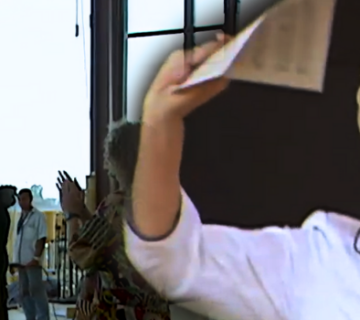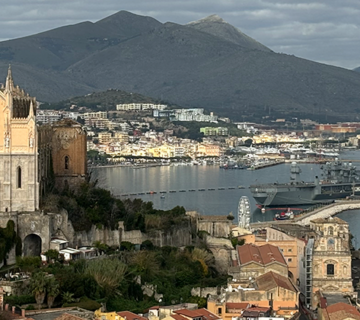 An evening of testimonies and sharing over the work of the Synod on the New Evangelisation with 27 bishops and thirty lay people who are attending the Synod. Opening remarks were given by the President of the Bishops Conference of Thailand, Archbishop Francis X. Kriengsak who is also the moderator of the Bishops Friends of the Focolare Movement. “Our words are accepted when they are an expression of what we are living,” he exhorted. Authenticity is needed in “men and women who have experienced God and are living icons of God’s love for people.” Where? In the usual places: at work, school, in the field of health, sport, family, neighbourhood, internet.
An evening of testimonies and sharing over the work of the Synod on the New Evangelisation with 27 bishops and thirty lay people who are attending the Synod. Opening remarks were given by the President of the Bishops Conference of Thailand, Archbishop Francis X. Kriengsak who is also the moderator of the Bishops Friends of the Focolare Movement. “Our words are accepted when they are an expression of what we are living,” he exhorted. Authenticity is needed in “men and women who have experienced God and are living icons of God’s love for people.” Where? In the usual places: at work, school, in the field of health, sport, family, neighbourhood, internet.
Referring to his personal journey in an almost entirely Buddhist society, Archbishop Kriengsak concluded by saying: “but our personal testimony no matter how heroic is not enough”. In order for the Gospel to be effective and convincing “we must give life to small cells of Gospel life, and we bishops must be a living part of a joyful and attractive community,” “the Church is attractive when it is a living communion.”
 Anna Pelli from the Focolare’s Centre for Studies and involved in the Movement’s dialogue with the ecclesial world, gave a presentation on the Ecclesial Movements as the “Word” that evangelizes. She presented the Church in its charismatic richness according to an unprecedented image through which Chiara Lubich described it: “as a magnificent garden in which all the Words of God blossom:” there “Jesus blossoms, the Word of God, in all of His various expressions.” (1) From here stems the relationship “of unity and distinction” among the various spiritualities in the Church that are fruits of “of the creativity of the Spirit, His gifts to the Church of today, in order to open new paths of understanding and of putting into effect of God’s infinite truth.” Herein is found the call to live out one’s own specificity, in order to make the Church become “a living Gospel,” “an evangelizing people.”
Anna Pelli from the Focolare’s Centre for Studies and involved in the Movement’s dialogue with the ecclesial world, gave a presentation on the Ecclesial Movements as the “Word” that evangelizes. She presented the Church in its charismatic richness according to an unprecedented image through which Chiara Lubich described it: “as a magnificent garden in which all the Words of God blossom:” there “Jesus blossoms, the Word of God, in all of His various expressions.” (1) From here stems the relationship “of unity and distinction” among the various spiritualities in the Church that are fruits of “of the creativity of the Spirit, His gifts to the Church of today, in order to open new paths of understanding and of putting into effect of God’s infinite truth.” Herein is found the call to live out one’s own specificity, in order to make the Church become “a living Gospel,” “an evangelizing people.”
The bishops also wanted to hear from the laity who are motivated by the spirituality of communion as it is lived in the Focolare among young people and old, believers and non-believers, people working in society and in ecclesial environments. The statement of one Russian scientist, an unbeliever, was very meaningful. It was shared by Franz Kronreif from the Focolare: “If one day you told me you did not believe in God, I would be sad for you and for me. I would feel poorer.”
 In the afternoon a conclusion was drawn, which was expressed by Archbishop Francis Kriengsak: the world is waiting to see “spaces” being created, “spaces of the Risen Lord,” “places” that give “visibility to a humanity that has been shaped by the Gospel, where communion reigns, a communion of hearts and of goods.” “It’s unthinkable that we bishops alone will manage to renew the Church. The laity must be in the front lines,” said one bishop from Korea.
In the afternoon a conclusion was drawn, which was expressed by Archbishop Francis Kriengsak: the world is waiting to see “spaces” being created, “spaces of the Risen Lord,” “places” that give “visibility to a humanity that has been shaped by the Gospel, where communion reigns, a communion of hearts and of goods.” “It’s unthinkable that we bishops alone will manage to renew the Church. The laity must be in the front lines,” said one bishop from Korea.
The participants then moved to the Basilica of St. Bartholemew on Tiber Island, where they were warmly welcomed by the Community of San’Egidio for the celebration of prayer and a light moment of fellowship afterwards.
By Victoria Gómez
(1) C. Lubich, “Nuova Umanità”, 3-4 (1997), p.389.


 Italiano
Italiano Español
Español Français
Français Português
Português


